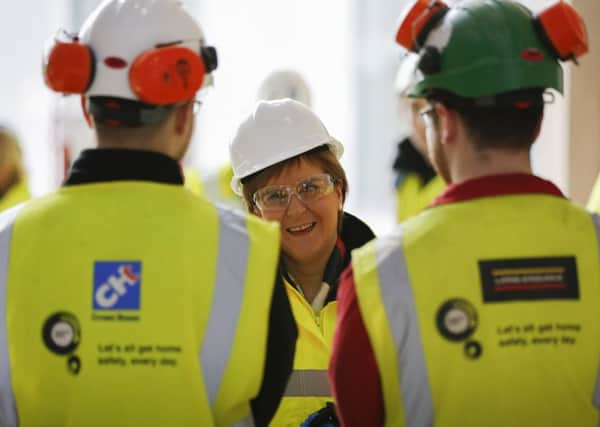Calls to help Scots firms amid fear of recession


Tackling high business rates, reducing the uncertainty caused by referendum threats and getting the best possible Brexit deal for Scotland were among the priorities listed by organisations representing Scottish firms.
Creating an income tax regime to attract talent was also mentioned when Scotland on Sunday spoke to business representatives ahead of the publication of Scottish growth figures for the first quarter of this year on Wednesday.
Advertisement
Hide AdAdvertisement
Hide AdEconomists have warned that Scotland is on the edge of a recession. If the GDP figures are below zero, it means Scotland will have endured two consecutive quarters of negative growth – the technical definition of a recession.
Last week Strathclyde University’s Fraser of Allander Institute warned Scotland was on the verge of a recession and expressed concern that the Scottish economy was lagging behind the rest of the UK.
Recent figures for GDP in Scotland showed a fall of 0.2 per cent from October to December last year at the same time as the UK economy grew by 0.7 per cent.
Regardless of whether Scotland does go into recession this week, Garry Clark of Scottish Chambers of Commerce said the Scottish economy’s performance was of concern.
“What’s really worrying is the gap between Scotland and the overall position of the UK and this divergence from the UK economy,” Clark said. Many employers fear they will be forced out of business as a result of a business rates revaluation which has seen the amount they pay escalate.
“Why should we be making it more expensive for people to do business here? We should not be alienating business,” said Clark.
Clark was also concerned about the Scottish Government’s income tax policy. The Scottish Government has declined to pass on a tax break for higher earners, which the UK government introduced by raising the threshold for paying the 40p rate of tax. The decision is estimated to have cost higher earners around £400 a year.
Clark said: “It is the precedent that sets and the message it sends out when businesses and employers are trying to attract people to Scotland. Scotland needs to attract talented people rather than making it more expensive to invest and work in Scotland. This differential is not to our advantage. We want this to be the most attractive place in the UK to work – not the most expensive.”
Advertisement
Hide AdAdvertisement
Hide AdHugh Aitken, CBI Scotland director, shared concerns about business rates and called for Scotland’s interests to be protected as the UK heads for EU withdrawal.
“What’s needed now is excellent co-ordination between the Scottish Government, the UK government and business to ensure Scotland’s interests are represented in the UK-EU negotiations,” he said.
“As powers are repatriated from the EU to the UK and devolved nations, a joined-up discussion with business should take place so powers are returned to the right level and companies can continue to benefit from an effective UK single market.
“Ultimately, the Scottish Government’s focus must be on measures to enhance productivity and boost the economy, including prioritising fast-tracking business rates reform, incentivising investment, improving educational attainment and ensuring Scotland is an attractive place to do business.”
Stuart Mackinnon, external affairs manager of Federation of Small Businesses Scotland, said Scotland was facing “a big challenge to get moving again”.
He argued more should be done to alleviate the cost of overheads, with the depreciation of sterling causing fuel bills to rise.
On business rates, he said: “We need a more modern system that gives smaller firms a helping hand.”
David Watt, of the Institute of Directors, added: “When governments cause uncertainty, then they don’t make business life easier.”
Advertisement
Hide AdAdvertisement
Hide AdA Scottish Government spokeswoman said: “Our income tax policy does not involve people paying more than they previously did, while we have also ensured competitive business rates by reducing bills and expanding reliefs.”